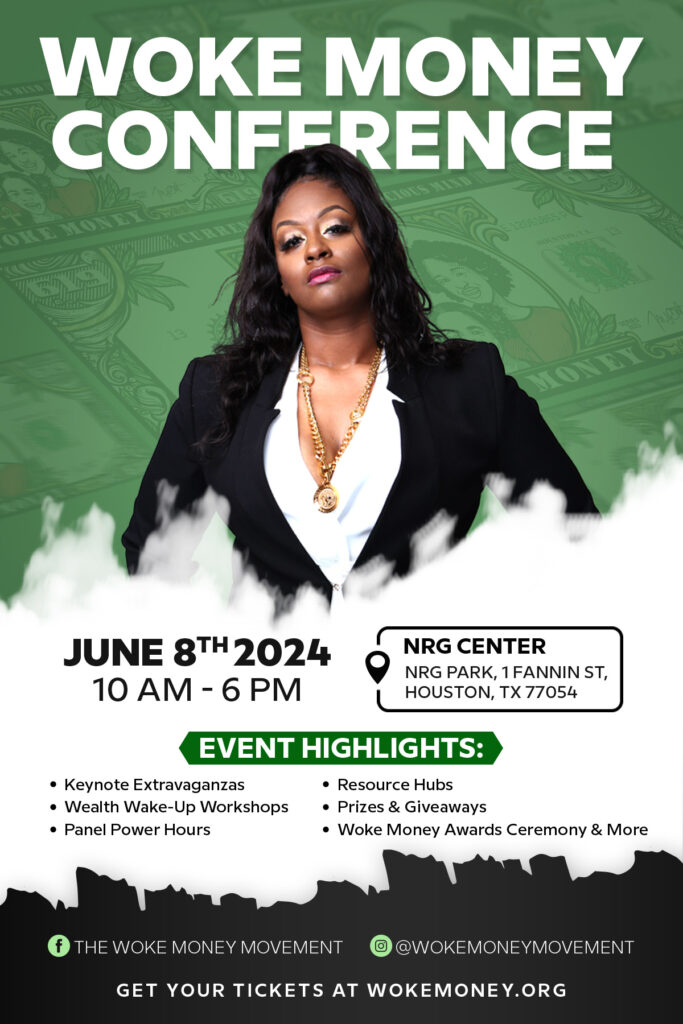Financial literacy is a cornerstone of personal empowerment and economic well-being. It equips individuals with the knowledge and skills to effectively manage their finances, make informed decisions, and plan for the future. In a world where financial complexities abound, from budgeting and saving to investing and debt management, being financially literate is essential for navigating the intricacies of modern financial systems. Moreover, it fosters resilience against economic uncertainties and empowers individuals to pursue their goals and aspirations with confidence. By promoting financial literacy, societies can foster greater economic stability, reduce inequality, and empower individuals to build a secure and prosperous future. This is why knowing someone who can provide valuable information to equip you is important.
Join us in our recent discussion with Catherine “Ms Cat” Mitchell who is the founder of The Woke Money Movement!
How did the Woke Money Movement come about?
The Woke Money Movement emerged from my experiences navigating the tax industry, where I observed a stark contrast between different socioeconomic groups and their attitudes toward money. On one side, I encountered high-earning colleagues, some of whom were millionaires, yet not all of them were making wise financial decisions. Many indulged in extravagant spending on frivolous items.
On the flip side, I also served a low-income demographic, where many individuals were in a perpetual struggle for survival. Witnessing these contrasting realities highlighted the critical importance of financial literacy for everyone, regardless of their income level or background.
Through the Woke Money Movement, I recognized the need to democratize financial education and resources, particularly within my Black and Brown communities. This movement aims to empower individuals with the knowledge and tools to make informed financial decisions, break cycles of financial instability, and foster greater economic empowerment and wealth-building opportunities.
By bridging the gap in financial literacy and promoting responsible money management practices, the Woke Money Movement seeks to create positive change and foster economic resilience within underserved communities.
You have the ability to empower individuals through your knowledge and available resources. What are some things that you have witnessed the access of readily accessible resources do for many?
Accessible resources have had a profound impact on individuals by empowering them with essential financial knowledge and skills. I’ve witnessed how financial literacy workshops, online courses, and educational materials have improved individuals’ understanding of budgeting, saving, investing, and debt management. This newfound knowledge not only boosts confidence but also enables proactive financial planning, leading to reduced debt burdens and increased financial stability.
Moreover, accessible resources inspire entrepreneurship and wealth-building opportunities. Many individuals leverage this support to start businesses and pursue investments effectively. Additionally, by engaging with financial issues and becoming advocates for financial literacy within their communities, individuals contribute to breaking generational cycles of poverty and promoting economic empowerment on a broader scale. Ultimately, accessible resources play a critical role in fostering economic resilience, empowering individuals to take control of their financial futures, and building stronger, more prosperous communities.
You are the Founder of the Woke Money Conference, and your goal is to educate and inspire black & brown people about the endless opportunities in properly planning for our futures as well as taking control of our finances. Why do you feel those in communities of color struggle more with money management?
The struggle with money management within Black and Brown communities can be attributed to systemic injustices, limited access to quality financial education, and cultural influences on financial behaviors. Historical economic inequalities, including discrimination in employment and access to financial services, have contributed to disparities in wealth accumulation. Additionally, the lack of representation in the financial services industry and intersecting challenges related to race, ethnicity, and socioeconomic status further complicate financial decision-making.
To address these challenges, initiatives like the Woke Money Conference aim to empower individuals in communities of color by providing accessible and culturally relevant financial education. By offering resources and workshops that emphasize the importance of financial planning and wealth-building, we seek to inspire individuals to take control of their financial futures. Through advocacy, education, and community engagement, we can work towards breaking down barriers to financial literacy and promoting economic empowerment within Black and Brown communities.
The goal of creating generational wealth is a dream for so many people of color. What would you say the steps to creating generational wealth look like?
Creating generational wealth involves first educating yourself and your family about financial concepts like budgeting, saving, investing, and debt management. Diversify income streams beyond traditional employment by exploring entrepreneurship, real estate investment, or passive income opportunities. Invest for the long term in assets like stocks, bonds, real estate, and retirement accounts to benefit from compounding growth. Preserve wealth through proper asset protection and estate planning. Teach financial literacy to future generations early on to ensure responsible money management skills. Seek guidance from financial professionals who understand the unique challenges faced by communities of color. Finally, adopt a generational mindset by making intentional decisions that prioritize long-term wealth accumulation and intergenerational prosperity.
Implementing these steps with dedication and strategic planning can pave the way for creating a legacy of financial stability and empowerment that transcends individual achievements and positively impacts future generations within communities of color.
I love that one of your panel discussions for the event is “Healing Our Relationships With Money.” Share with us what that can look like for someone.
“Healing Our Relationships With Money” is a profound and transformative panel discussion that explores the emotional and psychological aspects of our interactions with money. For many individuals, improving their relationship with money involves addressing deep-seated beliefs, attitudes, and behaviors that past experiences, cultural influences, or societal norms may influence.
One aspect of healing our relationship with money is developing a healthier mindset towards wealth and abundance. This can involve overcoming limiting beliefs about money such as scarcity mentality or guilt associated with financial success. It’s about embracing a positive and empowered perspective that aligns with personal values and aspirations.
Additionally, healing our relationship with money may involve addressing emotional triggers related to financial decisions. For example, some individuals may have emotional spending habits rooted in stress, anxiety, or self-esteem issues. By cultivating self-awareness and emotional resilience, individuals can make more conscious and intentional financial choices.
Furthermore, healing our relationship with money includes practicing self-care and setting boundaries around financial priorities. This may involve budgeting, saving, and investing in alignment with personal goals and values, rather than external pressures or societal expectations.
Overall, healing our relationship with money is a holistic journey that integrates emotional, psychological, and practical approaches to fostering a healthier and more empowered financial mindset. Through self-reflection, education, and support, individuals can cultivate a positive and sustainable relationship with money that contributes to overall well-being and financial fulfillment.
Do you believe that the lack of financial literacy is a root cause of violence in our communities of color? Explain how you feel money can improve things and lessen the violence.
The connection between financial literacy and violence in communities of color is complex, and while financial literacy is not the sole root cause of violence, it can certainly play a significant role in addressing underlying socio-economic issues. Lack of financial literacy often correlates with economic instability and limited opportunities, which can contribute to heightened stress, frustration, and desperation within communities.
Improving financial literacy can have a positive impact by empowering individuals with the knowledge and skills to make informed financial decisions. When individuals understand budgeting, saving, investing, and debt management, they are better equipped to navigate financial challenges and pursue economic opportunities. This can lead to increased financial stability, reduced economic stress, and improved overall well-being.
Moreover, enhanced financial literacy fosters a sense of agency and empowerment, which can translate into healthier community dynamics. Economic empowerment through financial education can provide individuals with alternative pathways to success, reducing reliance on illicit activities and breaking cycles of poverty.
Our aim is to stay informed and connected with resourceful individuals in our communities. We want to encourage you to attend the Woke Money Conference and change the way you feel about your finances this year. Make plans to join others and discover new ways to manage your money with confidence and purpose.
Follow Us On Social Media!





